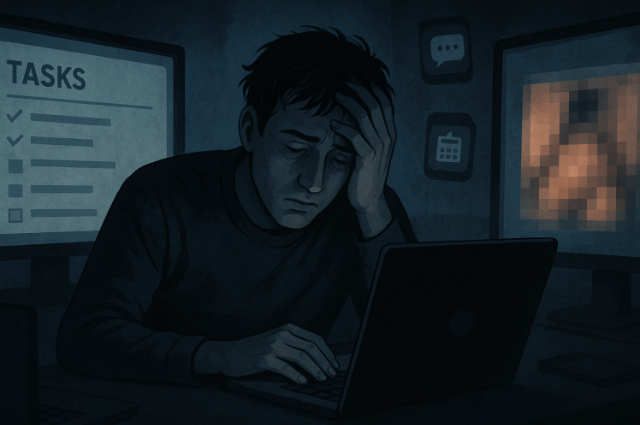
In modern times, the world is too fast. Everyone is busy chasing productivity and success. There is an overload of information and too many deadlines. People are working day and night, skipping lunches to reach counts in the millions. Likes, comments, shares, and followers—now everything is about numbers. There is a cycle of productivity, glory, exhaustion, and guilt. This is the image of today's hustle culture. In such an environment, people need quick escapes, and for many of them, the quick escape is pornography.
In the context of Indian society, porn is considered immoral. There is also no open, healthy, and clear discussion among people regarding sex education. Sex is seen as negative or something that should be kept hidden. Still, India is counted among those countries with the highest consumption of pornographic content.
If we examine closely, both hustle culture and pornography operate on greed, stimulation, dopamine rush, and ultimately addiction, leaving the individual feeling empty, drained, and detached. Pornography and hustle culture both promise the fulfillment of desire. Both provide short-term pleasure, which can corrode mental health. Both take advantage of people's struggles with pleasure, desire, and greed.
What we need is not the endless cycle of pleasure and guilt, but rather to change our perspective to look beyond these moral dilemmas. We should not be ashamed of sexual pleasures, but rather be more aware.
The stimulated environment
This age is one of stimulation. We work, and to take a rest, we're on social media. There is no space for silence and stillness. Never before has sexual content been so easily accessible, free, and algorithmically found at our fingertips. A pocket-sized device is enough to bring millions of explicit contents within seconds. Now, there is no limit to the content. The same goes for work culture; most jobs are work-from-home. Emails, messages, chats, and meetings—all happen in your bedroom. Work has become borderless in the same way pornography has. Thinking broadly, if we can understand that porn and hustle culture both operate on dopamine hits, we see that both have created a system to trigger a rapid flow of dopamine in the body. The anticipation, thrill, rush, and gratification all create stimulation: an artificial, temporary, and hollow pleasure.
Words like 'grind', 'work harder', 'chase your dreams', and 'chase deadlines' show how hustle culture is promoted and normalized at the cost of people's health. The promotion of pornography, although not openly discussed, can be seen in society in subtle ways. There is no open discussion on sex education, and hustle culture leaves individuals to find escapism, with no awareness of sexual pleasures. These create an interdependent loop. These issues are hard to notice, yet can still be found around us. Some more subtle reasons include not teaching children to build a healthy relationship with their bodies, no reforms in school education regarding sex education, loveless marriages, and an endless loop of entertainment. These may seem unproblematic at first, but if we think deeply, they contribute to constant craving, stimulation, and striving. When a child is taught to build a healthy relationship with their body, they will not indulge in unhealthy pornographic addiction as adults. They will nourish their bodies in the right way and honor their life partners without unwanted judgments and unrealistic body goals based on pornographic content. They will build healthy sexual relationships. An open, clear, and honest conversation about sex education will also reduce dependency on pornography.
Hustle culture and porn addiction both have psychological impacts. They provide short-term pleasure with long-term strain. They trap an individual in a guilt-shame loop. They also lead to anxiety and unrealistic expectations. Additionally, they cause burnout and emotional numbness. They also impact relationships and overall make life meaningless.
Breaking the Cycle
Self-awareness is the first step to breaking the cycle of hustle and pornography addiction. One should neither normalize them nor fight against them, but see and realize how adversely they are affecting one's life. It's a steady and consistent process. Secondly, this is not the opportunity to waste time in guilt, panic, and shame. Instead, it is time to reconnect with life by building slow routines, intimacy with loved ones, and frameworks of discipline. Thirdly, moral conduct is not enough to make us realize the loop. It brings conflict to the mind. It is beyond morality, addressing the inner human. The awareness lies in understanding the lie that is sold to us: that productivity is our worth, and pleasure should be available on demand. We need to question the system that keeps us in stimulation and off-balance. They both sell the same illusion: greed, desire, gratification. They keep us in a loop of hustle and consumption. It is time to be rebellious and cultivate worth, love, and satisfaction from within.
This is not easy, but it is a courageous step. To be courageous enough to acknowledge weaknesses and challenge oneself to rise beyond them is important. Remember, it is not a one-day fight, but a war to go through every day. The desire, greed, and the quest for gratification are not limited to jobs or the habit of watching pornography; they go beyond this. The addiction to shopping, taking bribes, and seeking gratification on social media also has the same root. In this overstimulated environment, it is difficult to see the subtle roots, but they are the same. Don't water the root, and the tree will die on its own.
